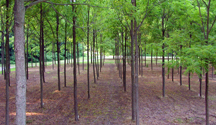
September 28, 2004
NSF launches one-of-a-kind tree genetics center
WEST LAFAYETTE, Ind. - Purdue University will lead a new National Science Foundation research center dedicated to improving the quality of valuable hardwood tree species through advances in genetics.

|
The joint center will involve scientists at Purdue and Oregon State University in addition to several federal agencies, private companies and trade associations. This partnership will allow forestry researchers to advance their work in improving the quality of hardwood tree species native to Indiana and much of the Midwest, such as black walnut, northern red oak and black cherry, which are highly prized by the fine furniture and cabinetry industries.
Scientists affiliated with the new Center for Tree Genetics will build upon the genetics research already under way at the Hardwood Tree Improvement and Regeneration Center, or HTIRC, a joint U.S. Department of Agriculture Forest Service and Purdue research facility.
"This center is the only tree genetics center that the NSF has funded anywhere," said Charles Michler, head of the HTIRC and director of the Center for Tree Genetics. "This recognition acknowledges our position as one of the top forestry programs in the country."
The joint center will receive $650,000 over five years from NSF plus $300,000 each year from Purdue's six partners and $150,000 each year from Oregon State's industrial partners.
The nature of this NSF program highlights a developing trend in research funding, by which federal agencies encourage collaboration between universities and the private sector, said Rick Meilan, a center researcher and associate professor of molecular physiology at the HTIRC.
"Today, we're seeing a paradigm shift in which the federal government actively encourages these kinds of partnerships," he said. "We're seeing more and more private sector funding of the kinds of research that have historically been funded by the government."
While the center's partners may span state lines, center activities will be vital to Indiana's future economic growth, Michler said. "We'll develop new technologies and create new jobs because of those technologies, and by training our own students for those jobs, we'll help stop the 'brain drain' Indiana has seen in recent years."
Most people recognize Indiana for its corn and soybean production, but few realize the scope and economic importance of Indiana's forest industry. Forest-based manufacturing employs more than 56,000 people and adds more than $8 billion to the state economy every year. Indiana's forest products industry is the sixth-largest manufacturing sector in the state, and it ranks first nationwide in the production of wood office furniture and kitchen cabinets, and hardwood veneer, according to the Indiana Department of Natural Resources Division of Forestry.
Some of the first projects center researchers will tackle include figuring out how to insert genes that impart traits such as insect and herbicide resistance into economically valuable hardwood tree species.
Center researchers also will investigate how trees regulate the production of heartwood, the dark-colored wood in the interior of a tree valued by furniture and veneer makers.
"Trees like black walnut usually don't begin producing heartwood for the first 13 years of their life," Michler said. "One of our goals is to find out which genes regulate heartwood production and to use these genes to develop trees that produce it earlier in their life cycle. By doing this, we could reduce the time it takes to grow a commercially valuable tree by up to a decade."
Still another center project will examine the genes that control flowering in trees.
"When you're developing transgenic trees, you don't want any of the introduced genes to spread into the wild," Meilan said. He and his colleagues are investigating ways to shut down pollen production and flower formation to ensure that genes from transgenic trees cannot fertilize trees in the wild.
"Developing trees that are essentially sterile will benefit anyone working with transgenic trees," Meilan said. "We're finding that the genes in many different plants are very similar, and we could find that the same gene that controls flower production in black walnuts will perform this same function in other trees as well."
In addition to its research focus, the center will support two graduate students per year, and faculty affiliated with the center are eligible for supplementary NSF funds for a summer research program for undergraduate students.
"An important goal of this center is to train students to work in high-tech fields like molecular biology," Michler said. "Students who gain research experience here will have the potential to work for companies affiliated with some of our industrial and government partners."
The Center for Tree Genetics is partially funded through the NSF Industry/University Cooperative Research Center program. This program provides start-up funds to establish long-term partnerships among universities, government agencies and industry.
While Purdue will retain the right to patent any intellectual property developed at the center, companies that provide funding for the development of new technologies are exempt from licensing fees for their use, Meilan said. Companies that are not members also will have access to technologies developed at the center, but will be charged licensing fees, he said.
The center's industrial and government partners are the Indiana Hardwood Lumberman's Association, National Hardwood Lumber Association, American Forestry Technology Inc., Fred M. van Eck Foundation, USDA Forest Service Research and Development, and USDA Forest Service State and Private Forestry.
Writer: Jennifer Cutraro, (765) 496-2050, jcutraro@purdue.edu
Sources: Charles Michler, (765) 496-6016, michler@purdue.edu
Rick Meilan, (765) 496-2287, rmeilan@purdue.edu
Ag Communications: (765) 494-2722; Beth Forbes, forbes@purdue.edu
Agriculture News Page
PHOTO CAPTION:
The Center for Tree Genetics, a joint research center sponsored by the National Science Foundation, will be led by Purdue University scientists. The center's goal is to improve the genetic quality of fine hardwood trees, such as these young walnut trees growing in a research plantation at Purdue's Martell Forest in West Lafayette, Ind. (Photo contributed)
A publication-quality photo is available at https://www.purdue.edu/uns/images/+2004/michler-walnutgenetics.jpg
To the News Service home page